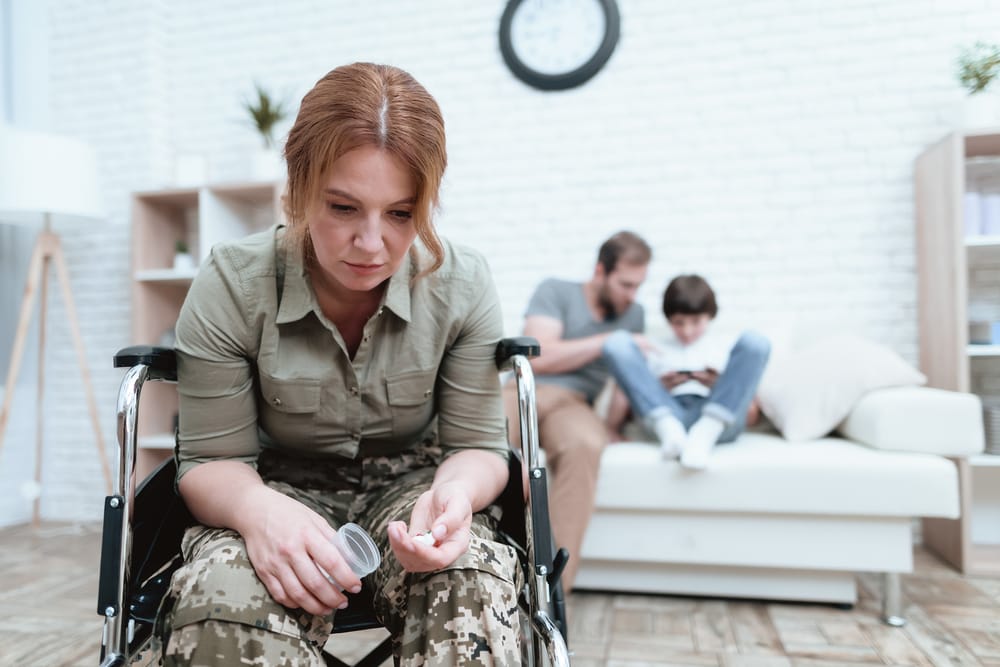As the U.S. faces the worst drug epidemic in history, veterans are statistically one of the most highly impacted groups when it comes to opioid addiction. The opioid epidemic’s effects on veterans are staggering. An overwhelming number of vets and their families are facing an addiction crisis as they try to cope with long-standing injuries that occurred while working in service to this country and while attempting to recover from the stresses of military service. Post-traumatic stress disorder (PTSD) was once the only major mental health concern when it came to veterans. Now, opioids have been added to the top of the list. A 2011 Veterans Affairs study found that veterans are twice as likely as non-veterans to die from accidental overdoses on highly addictive painkillers. Veterans, as a population, experience a high level of chronic pain. They may also mix opioids with other substances, not knowing the risks. Newsweek reported that 60% of veterans who fought in the Middle East, and 50% of older veterans who served in other wars, have chronic pain. This has caused a serious health issue because they have regularly been prescribed painkillers to deal with physical pain as well as anti-anxiety medications like benzodiazepines for post-traumatic stress disorder. Both benzodiazepines and opioids (and taking them in combination) can lead to fatalities. It’s been reported that those who served in the wars in Iraq and Afghanistan have experienced the highest pain levels, but recent research shows the opioid trend continues. A study conducted in 2014 involved the examination of 2,500 soldiers after a deployment; it was discovered that 15% used opioids regularly.
The VA Makes Changes
Politicians and media have pointed out that the U.S. Department of Veteran Affairs (VA) was responsible for over-prescribing opioids without taking into consideration the opioid epidemic’s effects on veterans. Its vast hospital system that treats veterans of all ages was responsible, they say, for extensive opioid prescriptions. The VA has stepped up its efforts to address the crisis to help curtail addiction and overdose. In 2013, the VA implemented the Opioid Safety Initiative (OSI) and it reportedly helped to lower the number of veterans given VA-issued opioid prescriptions by about one-third. The rate fell from 679,000 in 2012 to 471,000 in 2017. It was also announced that the VA had treated about 68,000 veterans as of early 2017. The VA became the only health-care system in the country to post information on its opioid-prescribing rates in the beginning of 2018. “Many veterans enrolled in the VA health-care system suffer from high rates of chronic pain and the prescribing of opioids may be necessary medically,” said Dr. David J. Shulkin, the U.S. Secretary of Veterans Affairs. “And while VA offers other pain-management options to reduce the need for opioids, it is important that we are transparent on how we prescribe opioids, so veterans and the public can see what we are doing in our facilities and the progress we have made over time.” He said the VA is continuously looking for ways to improve pain management and curb the opioid epidemic’s effects on veterans. He also shared highlights from the data collected by the different VA facilities:
- A 41% drop in opioid-prescribing rates between 2012 and 2017
- 99% of facilities decreased their prescribing rates
- San Juan, Puerto Rico and Cleveland, Ohio, top the list of medical centers with the lowest prescribing rates, at 3%.
- El Paso, Texas and Fayetteville, North Carolina are most improved, and decreased prescribing rates by more than 60% since 2012. El Paso’s prescribing rate decreased by 66% and Fayetteville’s decreased by 65%.
Giving Veterans and Providers Tools
The VA has also developed an Opioid Safety Initiative Toolkit, which is packed with educational material including Acute Pain Provider Guide: Acute pain Management Opioid Safety VA Educational Guide (2017) and nine other documents. These are available for download on the VA site. It is also trying to educate veterans on some of the keys to avoiding overdoses related to opioids. These include:
- Take as directed
- Don’t mix with other medicines
- Don’t share with other people
- Consult with your care provider about the dangers of addiction
- Reverse an overdose with naloxone
The opioid epidemic’s effects on veterans are devastating because so many vets are seriously injured while on active duty. They come back in pain and must live with this pain, sometimes for the rest of their lives. Men and women who served this country deserve the best mental health care and recovery options if they find themselves on the slippery slope of addiction. Sources: “Opioid Safety Initiative (OSI)” – U.S. Department of Veteran Affairs https://www.va.gov/PAINMANAGEMENT/Opioid_Safety_Initiative_OSI.asp “Veteran’s Administration-fueled Opioid Crisis Is Killing Vets” – Newsweek.com https://www.newsweek.com/2017/10/20/va-fueled-opioid-crisis-killing-veterans-681552.html “Veterans Face Great Risk Among Opioid Users” – PBS.org https://www.pbs.org/wgbh/frontline/article/veterans-face-greater-risks-amid-opioid-crisis/ “Opioid Abuse Takes Toll on Veterans” – Reuters.com https://www.reuters.com/article/us-usa-veterans-opioids/opioid-abuse-crisis-takes-heavy-toll-on-u-s-veterans-idUSKBN1DA1B2 “VA Becomes First Hospital System to Release Opioid Prescribing Rates” – U.S. Department of Veteran Affairs https://www.va.gov/opa/pressrel/pressrelease.cfm?id=3997 “Military Veteran’s Fight for Medical Marijuana to Kick Opioid Addiction” – CNBC https://www.cnbc.com/2018/02/07/military-veterans-fight-for-medical-marijuana-to-kick-opioid-addiction.html “About the Opioid Epidemic” – U.S. Department of Health and Human Services https://www.hhs.gov/opioids/about-the-epidemic/ “Drug Overdose In Veterans Receiving Opioids” – BMJI.com https://www.bmj.com/content/350/bmj.h2698.full “Helping Veterans Respond to Drug Overdoses” – U.S. Department of Veteran Affairs https://www.blogs.va.gov/VAntage/47237/helping-veterans-respond-opioid-overdose/

